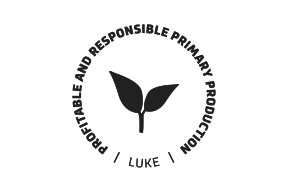Research Professor Titta Kotilainen: Horticultural technology research improves food security and the viability of horticulture while promoting well-being
Titta Kotilainen, PhD, has been appointed as the new Research Professor of Horticultural Technology at the Natural Resources Institute Finland (Luke) from March 1, 2025. Prior to her professorship, Kotilainen worked as a Senior Scientist in horticultural technology at Luke.

Titta Kotilainen is enthusiastic about her new role as a research professor.
"I start working in this position with a very bright outlook – I am a photobiologist after all," she laughs. "I look forward to painting with a broader brush, developing various projects and solutions that touch on plant production and the development of food systems in some way."
Kotilainen's career path to her professorship has been diverse. She began her biology career in soil ecology before transitioning to plant photobiology, focusing on the potential effects of ozone depletion for her doctoral research. She then gathered experience in the private sector for several years, designing LED lighting solutions for plant production. Later, she continued her photobiology research at the University of Helsinki, and in 2018, she moved to Luke as a Senior Scientist.
What is horticultural technology research?
Horticultural technology research, Kotilainen's current field of expertise, is a highly multidisciplinary area of study.
"In horticultural technology research, the focus is on optimizing the quality and sustainability of plant production through various scientific fields such as physiology, genetics, and soil sciences. The core areas include different production methods in open fields, plastic tunnels, greenhouses, and vertical farming solutions, as well as the necessary solutions for energy and water use, pest and disease control, and post-harvest technologies," she summarizes.
According to Kotilainen, this research plays a crucial role in ensuring sustainable and diverse food production. Its goal is to develop sustainable, resource-efficient, and environmentally friendly methods and practices, whether it involves the production of root vegetables and berries in open fields or year-round vegetable production in greenhouses.
"Horticultural technology research helps improve food security, the viability of horticulture, and promotes human well-being. The latter includes aspects like nutrition recommendations, food security, and the well-being and health benefits provided by green spaces," Kotilainen describes.
Broad collaboration as the key to success
During her professorship, Kotilainen aims to develop horticultural technology research at Luke by focusing on cross-disciplinary and cross-organizational collaboration.
"I will continue to enhance collaboration and build project portfolios at Luke across group boundaries, such as strengthening cooperation with the Plant Genetics and Genomics, Plant Health, and Sustainable Food Systems and Society groups. Right now, the main focus of my work involves energy issues, particularly those connected with electricity use in greenhouse production, relating to both resource efficiency in production and the development of energy system flexibility across Finland. Another current key topic at Luke involves replacing peat in growing substrates and animal bedding. Research cooperation with various universities and research institutes on these topics and deepening that cooperation even further is essential," Kotilainen explains.
Towards a more sustainable future
Although horticultural technology research may still be an unfamiliar field to many, Kotilainen believes it plays a central role in building a sustainable future.
"Through horticultural technology research, we improve food systems, take care of biodiversity, develop solutions to mitigate and adapt to climate change, and enhance people's quality of life," she concludes.
Anu Kaukovirta, Vice President of Luke's Production Systems Unit, strongly believes that Kotilainen is an excellent choice for the position.
"We were pleased to receive several strong applications for this professorship. Titta Kotilainen's strength lies in her versatile expertise and background, both in industry and research. Her vision for the future of horticultural production was ambitious and provided a solid foundation for steering the research direction. She is also exceptionally well-networked, both domestically and internationally, which allows her to build broad connections that support research," Kaukovirta says.
Kaukovirta also emphasizes the societal importance of horticultural technology research in the future.
"Horticultural production is a significant part of Finnish food production, both in terms of volume and value. The new nutrition recommendations further highlight the role of vegetables, fruits, and berries in the diet, and it is important to continuously develop the profitability and sustainability of domestic production. Issues such as energy prices and availability, changes in growing media, circular economy requirements, as well as new plant species and consumer preferences, present significant challenges to horticultural production. Luke's horticultural technology research aims to address many of these challenges," Kaukovirta concludes.
Research Professors are in key positions for the scientific expertise and international visibility and effectiveness of Luke. The aim is to ensure top-level research in Luke’s strategic fields, as well as applicability of research in business.




